Reba McEntire was born in McAlester, Oklahoma on March twenty-eight, 1955; she got her first break singing the national anthem at the 1974 rodeo finals. McEntire has recorded with the MCA and Mercury records, topped the country charts several times, and been titled best female singer by the Country Music Association many times. She has also acted in films and starred on her own sitcom. Additionally, she runs several businesses, including her own line of clothing and accessories.
Early Life and Career
Reba Nell McEntire was born on March twenty-eight, 1955, in McAlester, Oklahoma, to a family of champion steer ropers. While growing up, McEntire and her three siblings spent time together while traveling to and from their father's world championship rodeo performances. Their mom, Jacqueline McEntire, sustained her kids' melodic ability. During their many long vehicle rides, they would hang loosely by learning melodies and orchestrating.
Eventually, when Reba McEntire was in ninth grade, she and her two younger siblings formed the group the Singing McEntires and went on to perform at rodeos. The group later disbanded, but Reba continued to perform as a solo act throughout her college years.
Country Music Stardom
Though whoever's in New England (1986) was McEntire's ninth studio album, it was her first to garner a Grammy Award (best female country vocal performance, for the album's first released single, "Whoever's in New England"). By all accounts, the success of whoever's in New England was a product of its unique sound. A blend of McEntire's additional ancient twangy vogue with an additional thought pop sound appealed to a large audience, cementing the artist's place as country royalty for years to come.
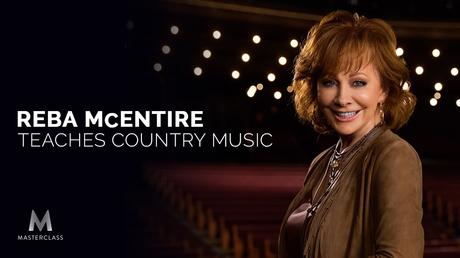
Always a strong businesswoman, the singer understood early on the importance music videos would have for her career. Her first video, for the single " Whoever's in New England " (1986), artfully told the story of a suburban housewife tortured by the idea of her philandering husband and his trips up north to visit a mistress. Employing well-known actors and directors, the singer took full advantage of this visual medium to showcase the strong narratives of her songwriting, using videos to tell full and compelling stories. In the future, her penchant for drama would not only drive record sales, but it would also fuel an unexpected acting career.
Also in 1986, Reba McEntire released the album What Am I Gonna Do about You and was named both "Female Vocalist of the Year" and "Entertainer of the Year" by the Country Music Association. In addition, she was named best female vocalist by the CMA for four consecutive years, from 1984 to '87.
The momentum didn't stop there. McEntire went on to churn out hit after hit, some more critically acclaimed than others but most selling by the millions. In 1990, she frees Rumor Has It, an album that eventually sold 3 million copies, going triple platinum by 1999.
On March 16, 1991, tragedy struck when a charter plane carrying eight members of McEntire's band crashed. There were no survivors, and the accident left the singer stunned and reeling. McEntire turned back to her music and, out of her grief, came a bleak but immensely popular album, For My Broken Heart, which she dedicated to her deceased bandmates. In the late Nineteen Nineties, she recorded duets with Brooks & Dunn and Linda Davis, which were fan favorites.1
Reba McEntire's Country Music MasterClass Review 2019
What is MasterClass?
Entrepreneur Aaron Rasmussen and film editor and director David Rogier started MasterClass in 2015. Based in San Francisco, it's an online education platform for creative professionals.
Of course, you don't need to travel to San Francisco to take a MasterClass.

You can watch MasterClass courses using your computer or phone and consume the materials at your own pace.
As a student, you can learn the art of comedy from Steve Martin, writing thrillers from James Patterson, dramatic writing from David Mamet, screenwriting from Aaron Sorkin and lots more.
It is a great way of learning online from top creators you would not normally have access to.
Who is MasterClass For?
The MasterClass is for writers, photographers, artists, musicians, painters, and creative professionals. It's ideal for students who are happy to learn at their own pace using a computer.
Unlike Lynda or Treehouse, MasterClass is suitable for writers, musicians, artists, and creative professionals.
This is an interesting niche.
Many of the opposite online courses I've taken facilitate students learn business skills like promoting or additional sensible skills like writing or internet development basics.
The MasterClass isn't ideal for people who thrive in classroom environments and prefer a more hands-on approach from teachers.
Reba McEntire's Recording Advice
We get right into recording by talking about what a music producer does. I think the term "producer" gets thrown around often and isn't always used correctly. Many people say "producer" when they talk about someone making beats. That person is actually more of a "composer," in my opinion.
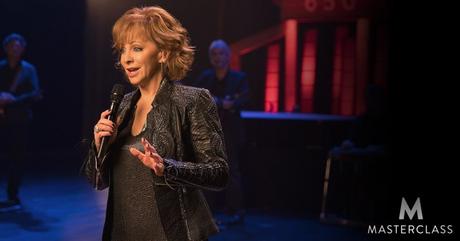
Reba, however, agrees with me on what a producer actually is. "A producer is hired by the record label or singer to come in and be the overseer of the project." In many ways, they are like a project manager, which I've talked about in detail here.
Reba loves recording and being involved in all aspects of it. She says she hasn't always been able to be involved, but now that she's a seasoned pro, they let her in on everything. She goes through her entire studio process, step by step.
The Session Musicians
For obvious reasons, this part was especially interesting to me. She talked about how the session musicians follow the demo closely but ask many questions of her and the producer along the way. "Are we keeping the bridge as is?" "Are we starting and stopping like that?" All of these are great questions because as I always say, communication is everything. I even wrote a book on how important communication is at the studio.
Recording works one of two ways: either everyone is in the studio on the same day and they all work together, or people work when they can and the mix engineer layers the tracks as they come in. I've worked both ways and strongly prefer the latter, but McEntire prefers having everyone in there at once, "so we know if a fiddle doesn't sound good, we've got a steel guitar right there to turn around or split it with maybe a fiddle AND a steel guitar." My personal opinion: That is something I as a session singer don't need to be involved in. I have no say in it, nor do the other session musicians who aren't playing those instruments. It's a major waste of our day to stand around while people figure that out. Unfortunately, most of us get paid by the job and not by the hour, so we're watching our day fly by and our wage reduced to cents per hour.
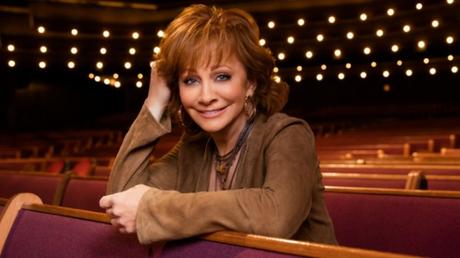
She even says herself that she's in her vocal booth for a long time waiting for musicians to tune up and get ready, and I'm just like...why? You could take that whole morning for yourself and come in when they're ready for you. But I highly value staying busy and clearly, for Reba, it is part of the process, so I'm not judging her methods.
Finding a Producer
McEntire highly recommends finding a producer you can trust, someone you can talk to about ideas. This isn't always easy when your label assigns a producer to you. If you really can't get along she recommends going to your label and asking for a new producer. You want a producer whom you get along with, but in my personal opinion, your producer should also be willing to push your limits. My co-writer and producer for Zebra Stone would argue with me and tell me a take sucked. I got upset, but I needed it. You don't want a producer who will coddle you at the expense of the song.
Prepare for the Studio
It blows my mind that people don't do this, and I'm glad to see that Reba agrees with me. KNOW YOUR SONG BEFORE YOU GET TO THE STUDIO. I really cannot tell you how many times people show up and don't even know the lyrics or melody yet. She says to remember that your session musicians are pros, and as much as they want to impress you, you should also want to impress them. I understand that we all have lives and things come up, so you may not be as prepared as you like. However, if this is important to you, I know you can find the time to learn the song, ESPECIALLY if you are signed to a label and ESPECIALLY if you wrote part of it.
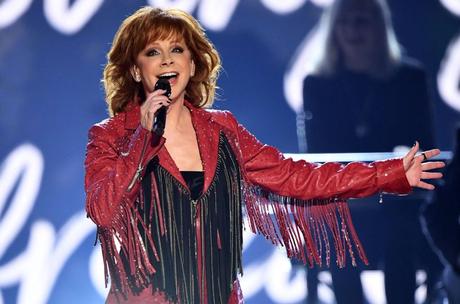
Christina Aguilera had a specific way she liked her studio. Reba is somewhat different: she likes room temperature water, "the cheapest possible" three-ply tissue, and a trashcan. Her ENT (ear/nose/throat doctor) says that she has sinus issues and needs a lot to care for her drainage. She doesn't eat citrus, dairy, chocolate or nuts when singing. She does like iced tea, which excites me because we could totally be twins.
McEntire also recommends getting into a character before recording a song. She's channeling the person in the song, leaving her personal life at the door.
Learn From Others
She also talked about FIGHTING WITH ALISON KRAUSS which is amazing because I love her. Krauss produced her and told her she needed to sing a song 10 times. Reba refused, saying she only ever does a song four times max. She relented because she really wanted to work with Alison, so they got started. Krauss wanted her to do fewer vocal runs (she calls them "curly cues" which is great and I'm stealing that). When Reba did as she was asked, they ended up only needing the three takes after all.
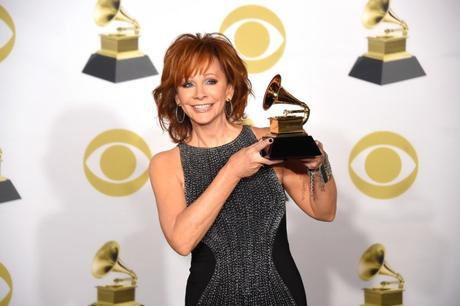
The next two lessons are case studies. The first is about the song "There's no U in Oklahoma," a song Reba wrote. The second is turning a cover she did, "Fancy," into an acoustic recording. We go through the whole process from the demo to finding a song key, a brief look at Nashville Numbers and then the whole long process. It's fun to watch and I recommend checking it out!
Reba McEntire's Values
McEntire says a great attitude can make up for a lack of talent. "Be honest and truthful and nice to everybody" is her advice. She also recommends avoiding gossip, because it's definitely going to spread. She says it's something she struggles with, but you have to watch what you're saying and whom you're saying it to.
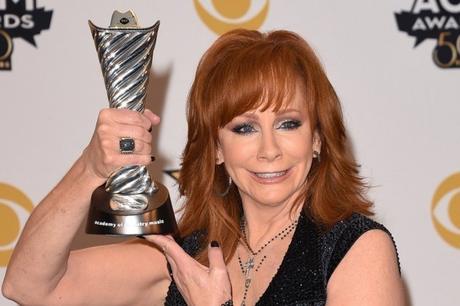
One thing she recommends is being reliable, and I see a LOT of artists or session musicians who fail because they are completely undependable. Having talent means nothing if you don't show up. A client is much more likely to hire someone they can count on with lesser talent than someone who is amazing but they never deliver on time.
Reba says when you find success, treat it gracefully. Money and whiskey bring out a true person, she says. That seems like it could be a song right there. Get at it, someone!
MasterClass Pricing Plans
There are two ways by which you can purchase a MasterClass, a single MasterClass and an All-Access Pass for any of the gurus on the platform.
The All- Access Pass comes in real handy when you wish to take more than one MasterClass, so this means that there is no limit on the number of MasterClasses on the All Access Pass.
A 30-day money-back guarantee is also available for any of the MasterClass packages you purchase and you will get a complete refund of the amount in case you are not satisfied with their services.
Mobile application
Access your MasterClass exercises anyplace in quickly by downloading the MasterClass application for your iOS or Android gadget for free from the App Store and Play Store. Save exercises as top choices, modify the playback speed and watch them whenever you need to.
You may also like:
Conclusion: Reba McEntire's MasterClass Review [year]

Reba McEntire is an excellent instructor with all her advice and the positive energy she presented during the course of the class.
This is a fun, informative and useful class! You can learn about a lot of performance tips, which I'm sure you will need at some point, however infrequently. A cool thing about MasterClass is that you can go back to specific classes at any time. So, you can revisit Reba McEntire 's MasterClass for tips you may have forgotten.
It was also a very interesting and illuminating look at the industry as a whole. There was a lot of great information for songwriters; Reba McEntire's MasterClass encompasses a career as a single and all that entails. I think you'll get great use out of them!


